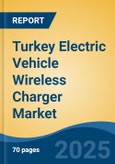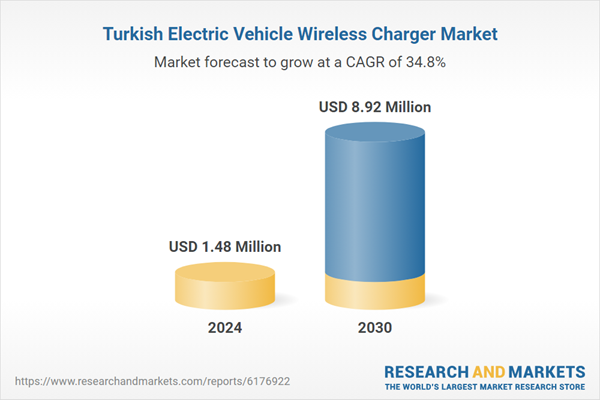Speak directly to the analyst to clarify any post sales queries you may have.
10% Free customizationThis report comes with 10% free customization, enabling you to add data that meets your specific business needs.
The Turkey electric vehicle wireless charger market is emerging as a niche yet critical segment within the broader e-mobility ecosystem. As electric vehicle penetration deepens, the need for more efficient, contactless, and space-saving charging alternatives is rising. Wireless charging solutions eliminate the need for manual cable connections, allowing for seamless charging experiences in public and private settings. Technological advancements in magnetic resonance and inductive power transfer are supporting this transition. Early-stage deployments in fleet operations and smart city initiatives are serving as testbeds for broader application. While adoption is still limited, a clear path for scale is becoming visible, especially as local companies and global players show interest in Turkey’s evolving EV landscape.
The growth trajectory is supported by government initiatives promoting electrification, R&D incentives, and increasing awareness of low-maintenance charging infrastructure. Turkey government, in July 2024, announced that it will invest USD 5 billion in electric vehicle production and USD 4.5 billion in battery manufacturing as part of a USD 30 billion future technology investment package.
Market Drivers
Rising EV Penetration
The increase in electric vehicle adoption across Turkey is driving demand for convenient and advanced charging solutions. As the number of electric two-wheelers, passenger cars, and commercial vehicles grows, so does the pressure on conventional charging infrastructure. As stated by Transport Ministry, the number of EVs in Turkey reached 208,006 by February 2025, marking a 121% increase year-over-year. Wireless charging offers a user-friendly alternative by eliminating physical connectors, simplifying the charging process. This aligns well with urban mobility trends where fleet efficiency and turnaround time are crucial. As EV adoption spreads to residential, fleet, and commercial applications, wireless charging is increasingly seen as a complementary solution to traditional plug-in systems, helping overcome limitations in space, accessibility, and cable management.Key Market Challenges
High Initial Setup Costs
The upfront cost of deploying wireless EV charging systems is significantly higher than traditional plug-in chargers. This includes advanced hardware, embedded infrastructure requirements, and integration with electrical grids. Ground pads and vehicle receivers must be precisely installed, often requiring civil and electrical modifications. For commercial operators or municipalities considering public installations, these costs may not justify the limited early-stage usage. In a price-sensitive market like Turkey, the higher capital expenditure can slow adoption, especially when return on investment is not immediate. Without economies of scale or strong financial incentives, many stakeholders may delay large-scale deployments.Key Market Trends
Integration with Smart Parking and Fleet Systems
Wireless charging is increasingly being embedded into smart parking and fleet depots to enable hands-free, automated charging. These systems are being integrated with telematics platforms, enabling real-time monitoring of battery levels, charging status, and energy consumption. As urban mobility becomes more data-driven, this integration supports intelligent route planning, reduced downtime, and optimized energy use. Fleet operators benefit from minimal manual intervention and streamlined vehicle turnover, especially in high-traffic areas. The trend is gaining interest among logistics, ride-hailing, and shared mobility services that prioritize automation and efficiency in operations.Key Market Players
- e-mobiTech
- Eşarj (Eşarj Elektrikli Araçlar Şarj Sistemleri A.Ş.)
- HDA Power Turkey
- Magneks - Wireless Charging & Fleet Management
- P.I. Works
- Powea
- Vektor Mobility
- WAT Mobilite
- Zebra Electronics
- ZES (Zorlu Enerji - ZES Dijital Ticaret A.Ş.)
Report Scope:
In this report, the Turkey Electric Vehicle Wireless Charger Market has been segmented into the following categories, in addition to the industry trends which have also been detailed below:Turkey Electric Vehicle Wireless Charger Market, By Vehicle:
- Two-Wheeler
- Passenger Car
- Commercial Vehicle
Turkey Electric Vehicle Wireless Charger Market, By Installed Location:
- Commercial
- Residential
Turkey Electric Vehicle Wireless Charger Market, By Technology:
- Magnetic Power Transfer
- Capacitive Power Transfer
- Inductive Power Transfer
Turkey Electric Vehicle Wireless Charger Market, By Region:
- Marmara
- Central Anatolia
- Aegean
- Mediterranean
- Black Sea
- South-Eastern Anatolia
- Eastern Anatolia
Competitive Landscape
Company Profiles: Detailed analysis of the major companies present in the Turkey Electric Vehicle Wireless Charger Market.Available Customizations:
With the given market data, the publisher offers customizations according to the company’s specific needs. The following customization options are available for the report.Company Information
- Detailed analysis and profiling of additional market players (up to five).
This product will be delivered within 1-3 business days.
Table of Contents
Companies Mentioned
- e-mobiTech
- Eşarj (Eşarj Elektrikli Araçlar Şarj Sistemleri A.Ş.)
- HDA Power Turkey
- Magneks – Wireless Charging & Fleet Management
- P.I. Works
- Powea
- Vektor Mobility
- WAT Mobilite
- Zebra Electronics
- ZES (Zorlu Enerji – ZES Dijital Ticaret A.Ş.)
Table Information
| Report Attribute | Details |
|---|---|
| No. of Pages | 70 |
| Published | September 2025 |
| Forecast Period | 2024 - 2030 |
| Estimated Market Value ( USD | $ 1.48 Million |
| Forecasted Market Value ( USD | $ 8.92 Million |
| Compound Annual Growth Rate | 34.8% |
| Regions Covered | Turkey |
| No. of Companies Mentioned | 10 |









